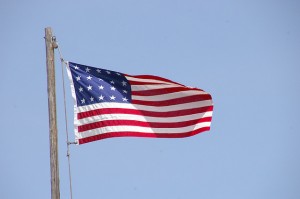On Abandoning ‘Americanized’ Names

Flickr: Scott Catron
Can difficult-to-pronounce Arabic names be as American as apple pie?
The Washington Post series about life for Muslim-Americans started off with the profile of a Palestinian-American who ditched his “Americanized” name for his legal one. His decision made me think about my own struggle in reclaiming my given name.
Fawaz Ismail grew up in Texas where he asked everyone to call him Tony, a name that “put people at ease.” He remained Tony after he moved to Northern Virginia, where he helped expand his family’s flag business. But Ismail dropped his nickname after the backlash against Muslims in the wake of the Sept. 11 attacks.
Now, a decade later, his name is a daily message to his fellow Americans: They must deal with him for who he is — a Muslim who loves his country and proudly sells its banner.
“A lot of people use a nickname to make it easier for Americans to pronounce,” he says, “but now, I don’t care. They’re going to have to pronounce my name. It’s not that hard — Fah-wahz.”
Many immigrants and second-generation Americans go by nicknames rather than their legal names for a number of reasons. I’m one such example. I grew up up in a small, rural and mostly-white Maryland town, and my parents decided I should go by the nickname Ele rather than my real, very Persian name: Elahe, the Arabic word for goddess (pronounced Eh-la-heh). They went by “Americanized” names themselves in an effort to make life easier, to assimilate as quickly as possible in a foreign land. And for 21 years, I was Ele (pronounced Elie). It wasn’t until after college that I decided to make the switch to my real name, both in my personal and professional worlds.
My decision was like Ismail’s; why must I accommodate or change my identity to convenience others or make them feel more comfortable?
Friends and family, for the most part, quickly adapted to the name change. But as a journalist, I’m constantly meeting new people and trying to develop sources. People aren’t as likely to remember difficult-to-pronounce names and they certainly don’t feel as comfortable saying them. I spend a considerable amount of time explaining how to pronounce it and answering inevitable follow-up questions, such as “where are you from?” All of those minutes add up, and it’s tiring having to explain yourself all the time — sometimes you just want to move on with your day.
I don’t have a foreign accent, English is my primary language and I was born in the U.S — it’s home. I can only imagine how much more difficult to would be to go by my real name if I didn’t have those things going for me. Many of us second-generation Americans have the luxury of being able to reclaim our names. But for our parents’ generation, the choice to go by an “Americanized” name isn’t just about making life easier for others. It’s about making life easier for yourself.
It’s been more than five years since I made the decision to drop my “Americanized” name. From time to time, I’ll run into an old friend who calls me Ele and it feels as if they’re talking about someone else. Or perhaps just a former version of myself, someone who didn’t make the effort to embrace the totality of who she was. Now, Elahe feels like me. And it’s just as American as Ele or Tony.
-
http://twitter.com/SeanGNet Sean Gallagher
-
island girl in a land w/o sea
-
http://DeadAmericanDream.blogspot.com AngryBroomstick
-
http://www.facebook.com/profile.php?id=15205222 Curtis Alia
-
jaded
-
jaded
-
http://thequietones.wordpress.com/ Marybeth
-
http://twitter.com/DYomoah Doreen Yomoah
-
Chris N.
-
Anonymous
-
Anonymous
-
Anonymous
-
http://twitter.com/ElaheIzadi Elahe Izadi
-
Estevão
-
Anonymous
-
Mitikumb




